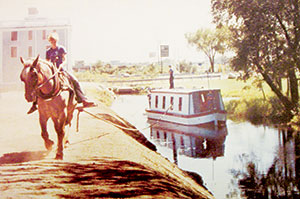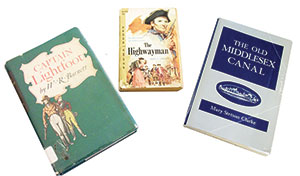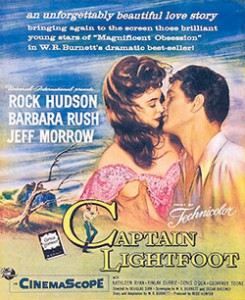
Eagle Feathers #58 – The Last Highwayman
By Bob (Monty) Doherty
The northern border of Somerville is unique in the fact that, at one time, four rivers were related to it. The section today is called Mystic Avenue, but originally was called the Medford Turnpike. It was built in 1803 as a trade route shortcut from Medford Square to Boston. The Mystic River was and still is on its north side. The former Middlesex Canal, connecting the Merrimack River with the Charles River and using the Concord River water as its source, flowed on Mystic Avenue’s south. It was a remote area, part of the Elias Haskett Derby Ten Hills Estate. Canal Lane and River Road, which are near the former Saint Polycarp’s Church, suggest its former location.
In 1821, the time between mid-Colonial and Civil War America, an incident took place there which became part of historic New England lore. It was a robbery, a highway robbery, committed by a young, devil-may–care bandit named Michael Martin (alias “Captain Lightfoot”). Martin had been in America for eighteen months and was working for Mr. Derby during part of that time. No one knew he was fleeing a notorious past as a “money or your life” highwayman in the British Isles. The English called Lightfoot and his former mentor, Captain Thunderbolt, “Knights of the Road.” He was trying to shed that past, and there was to be one last robbery.

The victims were a dignitary, Major Bray of Boston, and his wife. The Brays were returning from a party given at the Governor’s house in Medford, and the theft totaled $12 dollars and a watch. During the robbery, as was his custom, Martin was said to have declined jewelry from Mrs. Bray saying, “He never robbed ladies.” He just shook her hand and galloped away. After a frantic chase ensued, he was captured and imprisoned in Cambridge. A short time later, he escaped after brutally attacking the jailor and led authorities on another rousing horse chase. After electrifying the countryside, he was recaptured in Springfield and was returned to Cambridge for trial.

Unfortunately for him, not long before this event, punishment for armed robbery in Massachusetts had been changed. Retribution for this crime, which formerly had been branding or whipping, was upgraded to a capital offense punishment. Michael Martin, or Captain Lightfoot, was the first and last person to suffer this state’s gallows for highway robbery. At his execution, which drew hundreds, his last words were said to have been, “Don’t let your sons end up like me!” Because of the courteous and charming way he treated women, his life became an instant Robin-Hood type narrative. Articles were written, books were published, pubs named and tales told about him. He was seen as a gallant rogue saying “stand and deliver” to men, but chivalrous to the fairer sex.

Hollywood brought him back to life in the 1955 movie Captain Lightfoot, filmed in Ireland and staring Rock Hudson. More recently, Woburn’s Middlesex Canal tour, which brings to life early canal history, named their towboat horses, guess what? Lightfoot and Thunderbolt, after Martin and his British partner in crime. Like the legend of Jesse James, the story goes on.















Reader Comments